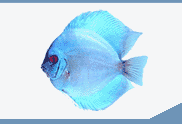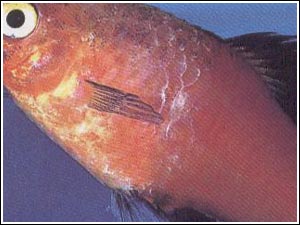

 |
||||||||||||
 |
||||||||||||
| Columnaries Disease | ||||||
| Ruth Francis-Floyd | ||||||
Columnaris is a bacterial disease of freshwater fish which frequently causes problems during warm weather. The disease is caused by a gram negative rod, Flexibacter columnaris. Prior to 1974, the organism was known as Condrococcus columnaris. Common names for this disease include "fin rot", "cotton wool disease", "cotton mouth disease", or "saddleback disease." History of the Disease Columnaris was first described in 1922. The bacteria which causes the disease was not isolated until 1944. Flexibacter columnaris is a member of the group of bacteria known as Myxobacteria, or "slime bacteria." This group of bacteria is difficult to work with in the laboratory and requires special media for isolation. The disease affects salmonids (trout and salmon) as well as many warm-water fish. Columnaris disease is often complicated by the presence of other bacterial pathogens, such as Aeromonas or Pseudomonas, and secondary fungal infections. Flexibacter columnaris is considered an ubiquitous organism which means that it is commonly found in water, soil, and even on the skin of healthy fish. Disease is thought to result more from stress factors which adversely affect the fishes' natural defense mechanisms, than from the presence of bacteria. Factors believed to predispose fish to this disease include parasitic infestation, seining and handling, crowding, and exposure to higher than normal water temperatures. Anything which causes damage to the epithelium (skin) may increase the likelihood of a columnaris outbreak.  Behavioral Signs of Columnaris
Behavioral Signs of Columnaris
There are no specific behavioral signs exhibited by fish infected with columnaris. Sick fish show general signs of malaise such as loss of appetite, slow swimming, and hanging at the surface of the water. Sick fish make little attempt to escape capture. Fish infected with F. columnaris do NOT normally exhibit "flashing" or other signs of external irritation unless the bacterial infection is complicated by a parasitic infestation. more ... |
 |
|||||
| About Us :: Message Board :: Chat | |||||
| Library :: Photo Gallery :: Links & Resources :: Breeders & Sponsors :: Merchandise | |||||
| Website designed by: EthanCote.com | © 2001-2004, SimplyDiscus.com. All Rights Reserved. | ||||